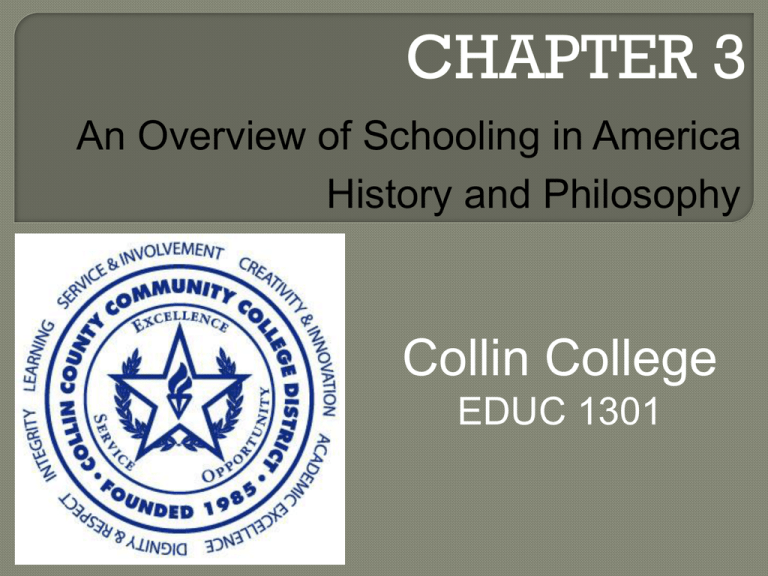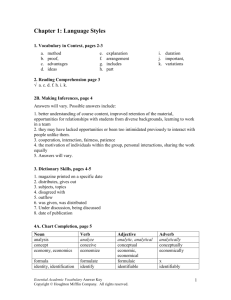
CHAPTER 3
An Overview of Schooling in America
History and Philosophy
Collin College
EDUC 1301
Consider:
• Role of wealth, privilege, & social capital
• Effect of geographic location on access
• Goals of education
• Effects of immigration
• Transmission of values & beliefs
• Roles of local, state, federal governments
Old
Deluder Satan Act (Mass., 1647):
Why was it called that?
• A town of 50 households: Must appoint & pay a
teacher of reading & writing
• 100 households: Must offer a grammar school
Result: The
schools
spread of Latin grammar
• Forerunner of American high school
• Run by town board
• Financed by students’ families
New
England
• Mostly Puritan, taught Scripture
• Town and district schools
Middle
Colonies
• Diverse population
• Private venture schools
– First forms of public schools
– Earliest vocational education
• Lack of formal education for many
South
– Dispersed population
– Social-class, racial distinctions
• Private tutoring for wealthy
Copyright by Houghton Mifflin Company. All rights reserved.
10 - 4
Congress
set aside land for public
schools
One-room schoolhouses, multi-age class
Common schools: Public, tax-supported
elementary schools (1820s)
Academy: Private secondary school
• Broader, practical curriculum with electives
• For rich, some open to girls
Jefferson, Franklin, Mann:
• Democracy needs informed citizens & an
education system that promotes meritocracy
Immigration
in 1830s-1840s created new
tasks for schools:
• Workforce training
• Assimilation of “morally dubious” immigrants
into dominant culture
Two-year
programs in educational
philosophy & teaching methods (1830s)
• Catherine Beecher: Train women teachers
• Booker T. Washington: Train African American
teachers
Selected video excerpts from
this history of the teacher in
American public education
Copyright by Houghton Mifflin Company. All rights
reserved.
98
Take
the Philosophy Test
11 M/C Questions
No wrong answers
Score with Chart on page 3
Copyright by Houghton Mifflin Company. All rights
reserved.
910
SubjectCentered
Perennialism
Essentialism
ChildCentered
Existentialism
Progressivism
Copyright by Houghton Mifflin Company. All rights reserved.
9 - 11
Core
knowledge is essential to person’s
life in society, so schools should teach it
•
•
•
•
A.k.a. “back-to-basics,” the “three Rs”
Math, science, literature, history
America should have a common culture
“Teacher knows best”
Views
mind as central element of reality
Learning happens through contact with
physical world and reasoning from
observations
Active
learning through problem solving,
projects, hands-on experiences
Knowledge must be constantly redefined
and rediscovered to keep up with
constant change in the world
• School = laboratory driven by student curiosity
• Integrate subject matter & make connections to
real life experience
• Teach students to collaborate
School
should be democratic
Single
core curriculum focused on the
enduring ideas of the great thinkers
• A.k.a. the “Great Books”, timeless classics or
“great ideas”
Focus
on classic Greco-Roman literature,
history, art, philosophy, moral instruction
• Curriculum inflexible and unchanging
• Emphasizes Socratic method
Purpose
of life is to search for constant,
changeless truth
Goal: Improve
society by transforming
oppressive systems through education
• Social reconstructionism: Curriculum promotes
social reform
• Critical theory (Paulo Freire): Students should
challenge oppression
• Existentialism (Søren Kierkegaard): Truth lies
within individual, so students should choose
subjects & learning methods
Stresses
freedom and the responsibility to
choose
Needs and interests of the individual student
are more important than those of society
Learning is self-guided and self-paced
Curriculum is led by child’s curiosity, rather
than set by teachers and is foundation for
gaining personal freedom
• Emphasizes humanities, liberal arts
• De-emphasizes science
Copyright by Houghton Mifflin Company. All rights
reserved.
916
People
learn from the consequences of their
actions and those of others
Behavior that is rewarded is more likely to be
repeated
Behavior that is punished or not rewarded is
less likely to be repeated
Curriculum should be based on clearly
defined behaviors which students are
rewarded for achieving
Copyright by Houghton Mifflin Company. All rights
reserved.
917
Knowledge
must be constructed in the mind
by each learner, rather than transmitted
Learners constantly reconstruct their mental
knowledge as new information becomes
available
Curriculum should involve students in real
situations that let them use and reconstruct
prior knowledge as new information is
presented
Copyright by Houghton Mifflin Company. All rights
reserved.
918
An
ongoing process
Requires reflection and experience
Eclecticism is not an excuse for sloppy
thinking
Copyright by Houghton Mifflin Company. All rights
reserved.
919
Write Your
Philosophy of Education
Guidelines are in the lab manual
Due March 22
USE NAME OF A PHILOSOPHY!
Copyright by Houghton Mifflin Company. All rights
reserved.
920

